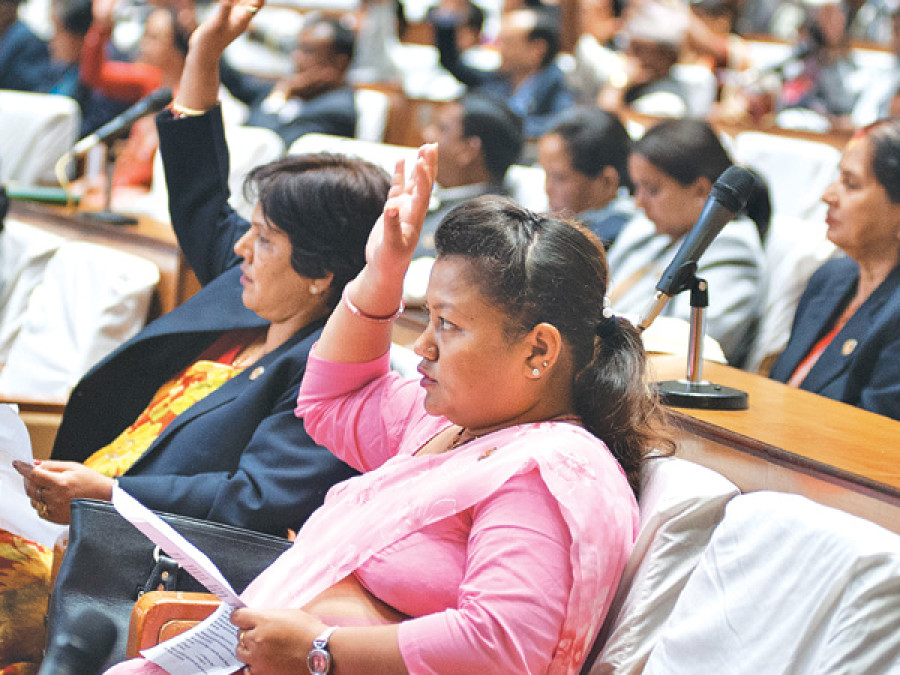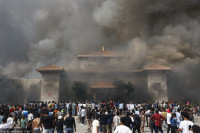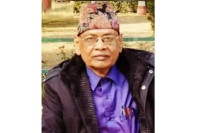Valley
House rules passed, finally
In a major breakthrough, the House on Sunday finally endorsed the Legislature Parliament Business Operation Regulations-2016, clearing the hurdle for parliamentary endorsement of the chief election commissioner, apex court justices and ambassadors.
Binod Ghimire
In a major breakthrough, the House on Sunday finally endorsed the Legislature Parliament Business Operation Regulations-2016, clearing the hurdle for parliamentary endorsement of the chief election commissioner, apex court justices and ambassadors.
The rules were passed, ending an eight-month long impasse, by a two-thirds majority after the main opposition Nepali Congress agreed to a 15-member Parliamentary Hearing Special Committee, softening its stance for a 75-member committee.
The regulation drafting process that began in October last year had been the major bone of contention between the ruling and opposition parties as they were divided over the size of the hearing committee.
The NC and some fringe parties had been lobbying for continuation of the 75-member body that existed before the promulgation of the new constitution.
The ruling coalition, on the other hand, was for downsizing it as per Article 192 of the new constitution. The largest party backtracked after the ruling alliance prepared to put the matter to a vote if there was no consensus by Sunday. The NC’s demand was certain to be dismissed as the ruling alliance commands a comfortable majority in Parliament.
The hearing committee has six members from the NC, four from the CPN-UML, two from the CPN (Maoist Centre) and one each from the Rastriya Prajatantra Party-Nepal and the Madhesi Janadhikar Forum-Loktantrik.
One seat has been set aside for the agitating Madhes-based parties.
“The parties finally came together to endorse the regulations,” Speaker Onsari Gharti said in a brief interaction with media persons. The House proceedings would now move ahead effectively, she added. All the lawmakers, except for two from the Nepal Majdoor Kisan Party and one each from the Khambuwan Rastriya Morcha and the Janata Dal, voted in favour of the rules.
According to Gharti, the first meeting of the hearing committee will be held on Monday to start the process to select its chairperson. The committee would start work within a week.
The appointment of the chief justice, chief election commissioner (CEC), justices and ambassadors was halted in the absence of the hearing committee. CJ nominee Sushila Karki and CEC nominee Ayodhee Prasad Yadav have been leading the institutions as their acting chiefs. The appointment of 11 justices for the Supreme Court and 21 ambassadors for foreign missions recommended over a month ago has not materialised in the lack of hearing.
According to the regulations, a two-thirds majority of the committee can endorse or reject the nominations, instead of the existing simple majority. As per the rules, it is mandatory to start the House meeting within two hours of schedule.
Currently, House proceedings are often postponed for hours without prior notice. In the new arrangement, ministers concerned have to respond to the queries of lawmakers within a space of time determined by Parliament.
What led to breakthrough
The NC, which was adamant on a 75-member hearing committee, finally agreed to a 15-strong panel as the ruling coalition offered it leadership of the committee. There has also been an agreement to allocate one of the two Judicial Council vacancies for an NC nominee. For the sake of a semblance of agreement, the ruling parties agreed to endorse an amendment registered by the largest party. The need for a two-thirds majority to endorse or reject a nominee was proposed by the main opposition party.




 8.12°C Kathmandu
8.12°C Kathmandu











